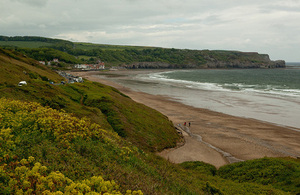Influence management of inshore fisheries in England
The MMO is looking to appoint a number of members with marine experience to Inshore Fisheries and Conservation Authorities in England.

Coastline
Each IFCA needs members who will take a balanced approach to caring for our seas, assessing the priority and importance of all users and stakeholders. These members will contribute their knowledge and expertise to provide sustainable management of the inshore marine area of their IFCA district.
They will work to guide the IFCA to deliver its remit, set out under the Marine and Coastal Access Act 2009, and in line with Defra guidance.
David Abbott, Head of Marine Compliance for the MMO, which is making the appointments, said:
“This is an excellent opportunity for people experienced in working in the inshore marine area to use their skills to influence decisions on how their local area is managed.”
The MMO actively encourages applications from individuals representing the economic, social and environmental needs of their IFCA district and who bring a variety of relevant interests including:
- Fishing groups(commercial and non-commercial)
- Environmental and Conservation groups
- Other parties interested in the work of IFCAs
Members attend quarterly meetings and should expect to commit broadly 1 day per month to their IFCA.
More information on the vacancies and how to apply is available on the dedicated recruitment page. The closing date is 2 February at 12pm.
Background
There are 10 IFCAs around the English coastline and they are responsible for sustainably managing sea fisheries within 6 nautical miles from shore. They have the power to make byelaws to protect resources and the environment in their area as well as also enforcing national and European fisheries legislation.
IFCAs are either committees or joint committees of the local authorities that fall within an IFCA district. They are tasked with sustainably managing inshore sea fisheries resources in their local area. They are made up of representatives from local councils along with people from across the different sectors that use or are knowledgeable about the inshore marine area, such as commercial and recreational fishermen, environmental groups and marine researchers, who offer their time voluntarily.
The MMO, Environment Agency and Natural England also each has a statutory seat on the IFCA. Through their local management and funding structures, IFCAs help put local councils, communities, businesses and individual citizens in the driving seat, allowing them to play a bigger part in the protection and enhancement of their inshore marine area.
More information about the IFCAs is also available on the Association of IFCAs website.